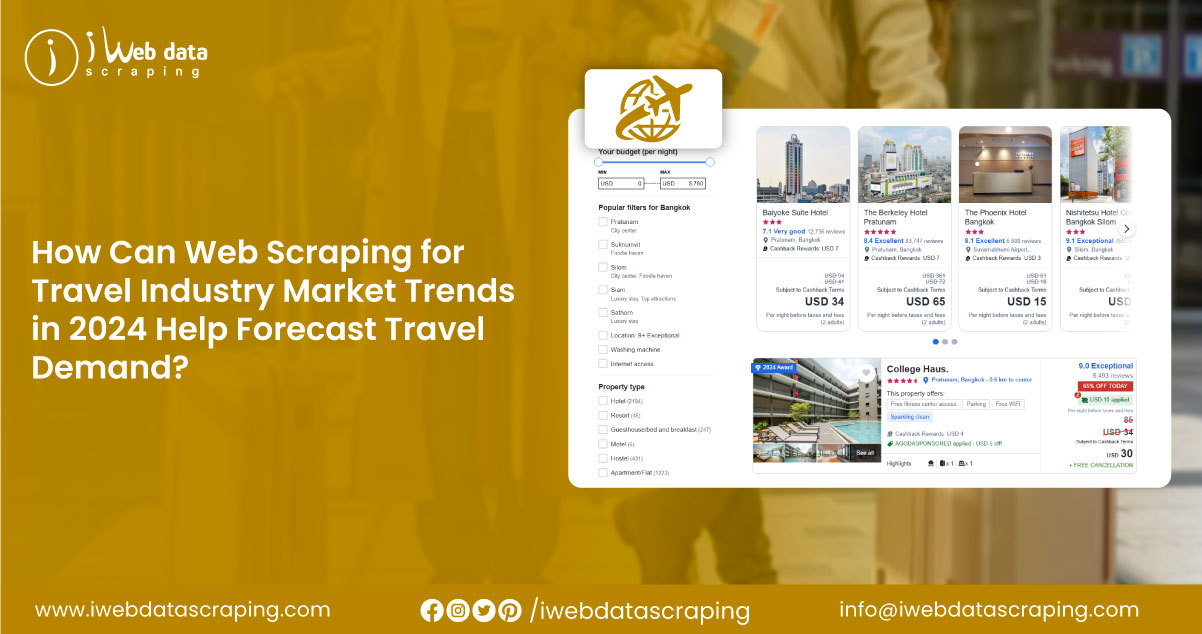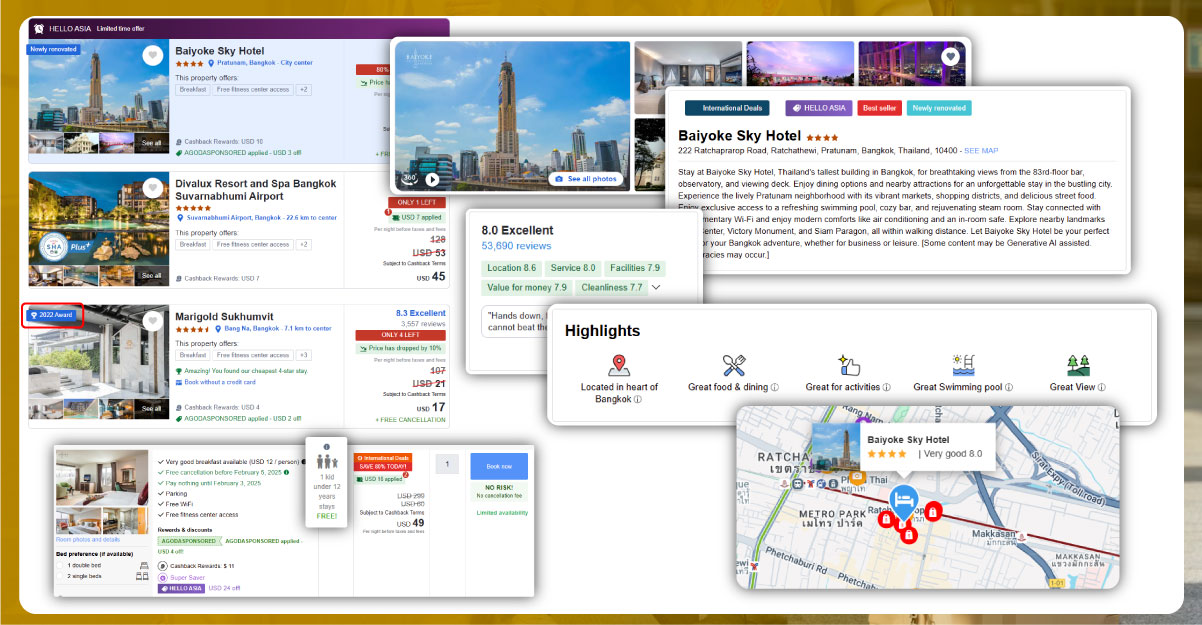
The tourism industry has recently significantly transformed and is primarily driven by digital advancements. One of the key technologies reshaping this landscape is Web Scraping for Travel Industry Market Trends in 2024. As travel platforms dominate the market, the ability to collect, analyze, and utilize travel data has become a crucial resource for gaining a competitive edge. In 2024, businesses in the tourism sector rely heavily on data-driven insights to stay ahead of competitors, forecast emerging trends, adjust pricing strategies, and improve customer experiences. Travel Data Scraping to Gain Competitive Intelligence in 2024 enables companies to extract valuable information from competitor websites, booking platforms, and review sites, helping them stay agile in an ever-evolving market. This technological tool empowers tourism companies to make informed decisions, optimize operations, and better meet the needs of modern travelers, positioning them as leaders in the highly competitive tourism industry.

Travel data scraping is the automated process of extracting relevant information from travel websites, apps, and platforms to gather real-time data about prices, availability, competitor offerings, customer feedback, and more. This data is gathered from various sources, including booking websites, hotel and flight aggregators, review platforms, and social media channels. In 2024, businesses in the tourism industry leverage this data to monitor competitor behavior, spot emerging trends, track customer sentiment, and make more informed business decisions. Companies can stay ahead of the curve by gaining Real-Time Travel Data Insights for Competitive Analysis.
One of the primary reasons for the increasing importance of data scraping in competitive intelligence is the sheer volume of data available. Travel websites and platforms produce immense data that can provide insights into various aspects of the travel industry. This includes competitor pricing, consumer demand, travel destination popularity, customer preferences, and seasonal trends. Web Scraping to Track Travel Industry Competition enables companies to gain a strategic advantage, anticipating shifts in the market before they happen.

Travel data scraping provides valuable insights for competitive intelligence, enabling businesses in the tourism industry to monitor competitor pricing, track trends, analyze customer sentiment, and forecast market demand. These benefits help companies stay competitive and make data-driven decisions.
One of the most direct ways travel data scraping helps in competitive intelligence is through price monitoring. Hotels, airlines, and online travel agencies (OTAs) often update their prices based on factors such as seasonality, demand fluctuations, and promotions. By scraping competitors' websites, businesses can monitor price changes in real time, allowing them to adjust their pricing strategy accordingly. This dynamic pricing approach enables travel companies to stay competitive and ensure they offer their customers the best possible prices.
For instance, a hotel could track room rates for similar properties in the same region to identify pricing trends and adjust rates to maintain competitiveness. Similarly, airlines can use scraped data from competitors' flight offerings to determine whether they need to introduce new routes, adjust fares, or enhance their services. By maintaining a close watch on competitor pricing, businesses can respond rapidly to changes in the market. Using Data Scraping Solutions for Travel Competitor Analysis, businesses can leverage real-time data to optimize their pricing strategies.
Another significant benefit of travel data scraping in the tourism industry is the ability to track and forecast trends. By scraping data from various platforms, businesses can analyze consumers' travel behaviors, identify emerging destinations, and predict travel patterns for upcoming seasons. This trend analysis is critical for companies aiming to stay ahead of the curve and capitalize on new opportunities.
For example, if data scraping reveals a surge in bookings for a particular city or country, travel agencies can quickly respond by creating specialized travel packages for that destination. Likewise, airlines and tour operators can identify rising destinations and introduce tailored services or marketing campaigns to target these trends.
In addition to identifying popular destinations, data scraping can reveal shifts in travel preferences, such as increasing demand for eco-friendly travel, luxury experiences, or digital nomad services. By staying informed about these changes, businesses can adjust their offerings and position themselves as leaders in emerging market segments.
Understanding customer sentiment is essential for staying competitive in the tourism industry. Travel companies can gain valuable insights into customer opinions by scraping reviews and ratings from online platforms like TripAdvisor, Google Reviews, and Booking.com. Sentiment analysis involves examining customer feedback to identify positive, negative, or neutral sentiments, which can help businesses identify areas where they excel and areas that need improvement.
For instance, if a competitor receives overwhelmingly positive reviews for its customer service or unique offerings, a travel company may adopt similar strategies to enhance its customer experience. Conversely, if a competitor's reviews reveal dissatisfaction with pricing or amenities, a company can capitalize on those weaknesses to offer a more attractive alternative.
Moreover, sentiment analysis through travel data scraping allows businesses to monitor the changing preferences of their target audience. Understanding whether travelers increasingly focus on luxury experiences or value for money can significantly influence how businesses tailor their marketing, services, and product offerings.
Travel data scraping enables competitor benchmarking by providing detailed insights into rival companies' offerings. Companies can compare competitor features, services, prices, and customer feedback to determine how they stack up in the marketplace. This information is invaluable for understanding market positioning and identifying areas for differentiation.
For instance, if a hotel chain notices that a competitor offers more extensive amenities, such as complimentary services, loyalty programs, or discounts, it may introduce similar benefits to attract customers. Likewise, a travel agency may notice that a competitor is seeing success with a specific type of packaged holiday and may choose to introduce similar offerings tailored to a different segment of travelers.
Benchmarking with the help of travel data scraping not only enables businesses to stay competitive but also allows them to find gaps in the market. Companies can gain a competitive edge by offering something unique that competitors are not providing. This can be accomplished using Travel Data Extraction Tools for Market Intelligence in 2024
Data scraping can help companies optimize their marketing efforts by identifying which channels drive the most traffic and engagement. Travel businesses can craft their marketing strategies based on proven success by analyzing how competitors are marketing their products and services—whether through social media, influencer partnerships, email campaigns, or paid advertising.
For example, a company can scrape social media platforms to identify travel-related content that generates high engagement. Businesses can gain insights into what resonates with their target audience by tracking hashtags, influencer collaborations, and popular posts. This can inform content creation, ad placement, and the overall digital marketing strategy. Additionally, analyzing demographic data and user preferences scraped from competitor websites can help companies better target their advertising campaigns. Companies can fine-tune their targeting to ensure they reach the most relevant audience by understanding who is booking certain types of trips or vacation packages.
Seasonal trends and regional demand fluctuations heavily influence the travel industry. Travel data scraping enables businesses to track these shifts in real time, which is especially crucial for industries like hospitality and airlines, where seasonal changes significantly impact revenue. For example, hotels can scrape data from booking websites to see when demand for particular regions increases, allowing them to adjust their offerings accordingly. If demand for summer vacations in coastal regions increases in early spring, businesses can ramp up marketing efforts or adjust their pricing to maximize occupancy rates. Similarly, airlines can identify trends in flight bookings for specific times of the year and adjust their schedules and capacities to cater to these demand shifts.
While travel data scraping offers tremendous opportunities for competitive intelligence, businesses must ensure they operate within legal and ethical boundaries. In some cases, scraping data from websites without permission may violate terms of service agreements or infringe on intellectual property rights. As a result, businesses must always ensure they are scraping data responsibly, obtaining permission where necessary, and respecting consumers' privacy.
Furthermore, companies should be cautious about scraping data in a way that could overwhelm websites with excessive traffic or interfere with a platform's normal operation. Ethical scraping practices, including respecting data privacy regulations such as GDPR, should be a fundamental part of any data strategy.
In 2024, travel data scraping has become an indispensable tool for competitive intelligence in the tourism industry. By harnessing the power of Tours and Travel App Datasets , companies can better understand market dynamics, consumer preferences, and competitor strategies. Whether optimizing pricing, identifying new trends, or improving customer experiences, travel data scraping gives businesses the insights needed to stay competitive in an increasingly data-driven industry. As the tourism landscape continues to evolve, those who embrace data-driven intelligence will be best positioned to lead the way and meet the demands of modern travelers.
Experience top-notch web scraping service and mobile app scraping solutions with iWeb Data Scraping. Our skilled team excels in extracting various data sets, including retail store locations and beyond. Connect with us today to learn how our customized services can address your unique project needs, delivering the highest efficiency and dependability for all your data requirements.